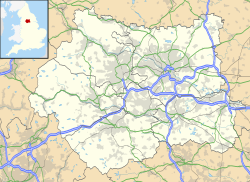Top Qs
Timeline
Chat
Perspective
Queensbury, West Yorkshire
Village in West Yorkshire, England From Wikipedia, the free encyclopedia
Remove ads
Queensbury is a village in the metropolitan borough and city of Bradford, West Yorkshire, England. Perched on a high vantage point above Halifax, Clayton and Thornton and overlooking Bradford, Queensbury is one of the highest parishes in England, with views beyond the West Yorkshire conurbation to the hills of Brontë Country and the Yorkshire Dales to the north and north west. Its population of 8,718 in 2001[2] increased to 16,273 in the 2011 Census.[1]
This article needs additional citations for verification. (June 2024) |
Remove ads
Queensbury is known as being the home of Black Dyke Mills, and the Black Dyke Band.
Remove ads
History
Queensbury was originally known as Queenshead, a name derived from a local public house, now a house on the High Street, which was popular with travellers on the pack horse route from Halifax to Bradford.
Governance
Summarize
Perspective
The village was divided between the township of Clayton in the parish of Bradford, and the township of Northowram in the parish of Halifax, both in the West Riding of Yorkshire.[3] It became a civil parish and urban district in 1894. In 1937 the civil parish was abolished, and the urban district was merged into the new Queensbury and Shelf Urban District. In 1974, the urban district was split; Queensbury was transferred to the City of Bradford in the new county of West Yorkshire.
Queensbury is a ward in Bradford Metropolitan District in the county of West Yorkshire, named after the village. It includes the villages of Clayton Heights and Horton Bank Top as well as a number of hamlets: Ambler Thorn, Calder Banks, Catherine Slack, Hazel Hirst, Hunger Hill, Little Moor, Mountain, Old Dolphin, Scarlet Heights, Shibden Head and West Scholes.
The ward typically voted for BNP and Conservative party councillors in the 2000s, however the decline of the BNP in the late 2000s and early 2010s saw a period of Conservative dominance in the ward. The 2020s have seen the first Labour councillors elected from Queensbury, amidst a national decline in Conservative party fortunes, and local disputes between candidates and the Conservative party caucuses causing the defections of Robert Hargreaves and Luke Majkowski in 2021 and 2022.
indicates seat up for re-election. indicates councillor defection. indicates a by-election.

Remove ads
Black Dyke Mills
Black Dyke Mills was built from 1835 onwards by John Foster as a wool spinning and weaving mill specialising in worsted and mohair fabric, and by 1851 dominated the town. John Foster & Son, the owners of Black Dyke Mills, were responsible for the construction of many of the buildings in and around Queensbury, each being for the benefit of the employees, be it housing or accommodation, shops or leisure facilities. In 1891, the company erected the Victoria Hall in Queensbury for the benefit of its workers and the local community - it had a concert hall, with gallery to seat 650 people, library, billiards room and many other facilities. It also sponsored the Black Dyke Mills Band, a band of international renown.
The mill has now been converted into individual business units. The company now manufactures elsewhere in the area.
Music
As well as being home to the world famous Black Dyke Band, Queensbury is also noted for its strong musical heritage. Home to the world-class rehearsal studio Backfeed, notable musical residents Giles Stocks and Joe Irish of Jon Jones and the Beatnik Movement, pop-punk trio State of Error, and the bands of the Sherry family, including the nationally successful Scarlet Heights (named after the hamlet), The Bad Beat Revue and Ti Amo. It is also home to Revolution, the band of the village's Scout group, who have won national youth band competitions and lead the village's annual Remembrance Day parade.
Remove ads
Transport
Summarize
Perspective
Three railway lines once converged on Queensbury, one each from Halifax, Keighley and Bradford, known as the Queensbury Lines, all belonging to the Great Northern Railway (later the London & North Eastern Railway). Where they met was located Queensbury station, which famously consisted of continuous platforms on all three sides of a triangular junction, an uncommon layout in the United Kingdom (the only other examples were Ambergate, on the Midland Railway in Derbyshire and Earlestown in Lancashire).
A short distance from the station on the Halifax line was Queensbury Tunnel, 2,501 yards (2,287 m) in length (the second longest on the Great Northern system after Ponsbourne Tunnel in Hertfordshire), while close by on the Bradford line was Clayton Tunnel at 1,057 yards (967 m). All these lines were closed to passengers in May 1955, later to freight in the 1960s, before finally closing to all traffic in 1972–74.
The main Bradford to Halifax road A647 road runs through the village as well as the A644 road. These roads intersect at the Albert Memorial. First Calderdale & Huddersfield & First Bradford bus route 576, runs through the village between Bradford and Halifax along the A647 road.
Remove ads
Gallery
- Black Dyke Mills
- Sunset over Queensbury in September 2010.
See also
- William Foster - John Foster's grandson
- Trinity Academy Bradford, a secondary school in Queensbury
- Listed buildings in Queensbury, West Yorkshire
References
External links
Wikiwand - on
Seamless Wikipedia browsing. On steroids.
Remove ads




